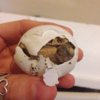You would think yes. Those questions I have no answer too. But a diapause is not necessarily only related to temperature, it can a dry spell, increase in moisture, water. Past diapause is merely something that keeps the egg from developing for a purpose. @Will had mentioned a specific species of turtle that lays it's eggs in water. But during the time when the water recedes the egg begins to develop. Once it hatches the water rises again where the eggs were placed thusly giving it a higher probability of successfully living. If I got that refreshed off memory correctly from a post a while back. I'm not versed enough to simply answer for the questions "why". So my simple answer will be for survival, and the Eco system and environment they naturally come from has to be mimicked.So if the egg depends on temperature (or lack of) to hatch, shouldn't it hatch sooner in an incubator, which has a constant temp all the time, allowing the egg to continue developing without pause?
Let's look at Pyxis(spider tortoises) each of the species and subspecies require a diapause to successfully hatch that diapause needs to be broken. In the wild Madagascar has a very short wet season within certain ranges of the different Pyxis. Naturally the nights will be very cool, and days will be moderately warm. The egg will take up to a year to hatch. Well in captivity breeders will initiate a diapause to incubation cycle. Some incubate for 5 weeks first then cool(diapause) at high50s-60s for 5-8 weeks, then proceed with incubation, sometimes this needs to be done once but sometimes(not many) it needs to be more than once. To break the diapause and get the embryo to develop.
But collectively compared to captivity and wild. The incubation time was +- the same. The diapause in the wild was just broken out into daily temperature fluctuations. Whereas in captivity it was consolidated. Both achieving the same result. So in a way the way we incubate in captivity(mostly) is not the exact way they would be incubated in the wild. But the difference in ecosystems we keep them in (incubator) does not reflect an exact science to the wild incubation. It's just within a certain threshold of temperature ranges that allow the embryo to develop onto a hatchling.
I've taken this entirely off topic galore.
Hope the little guy hatches



